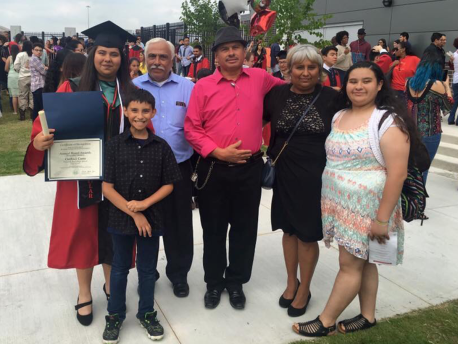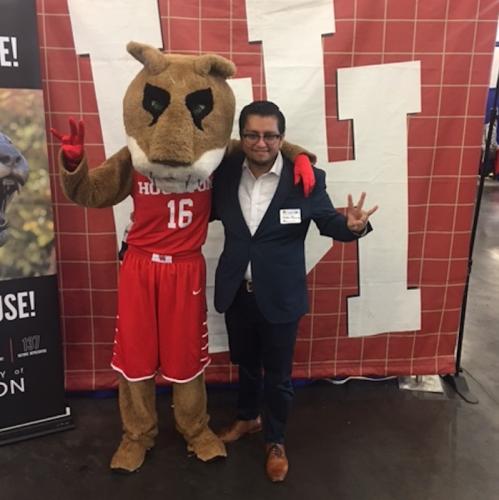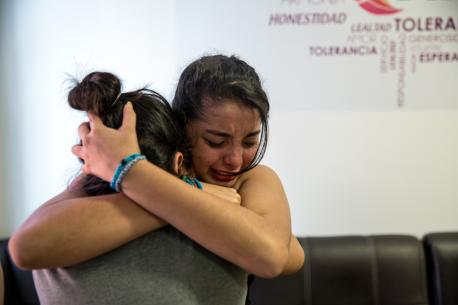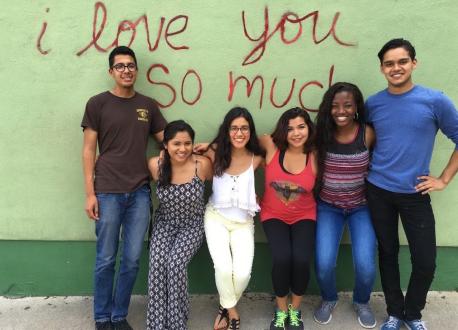
DACA and the Agonizing Waiting Game
The future of 700,000 Dreamers remains in limbo as the courts and lawmakers deliberate their fate.
On November 8, a three-judge panel of the 9th Circuit Court of Appeals upheld a lower court's ruling that blocked the Administration from terminating the Deferred Action for Childhood Arrivals program (DACA). DACA protects from deportation young undocumented immigrants who were brought to the U.S. as children. While the ruling protects 700,000 young people (known as "Dreamers") for now, the sense of uncertainty remains, as the battle over DACA is almost certainly headed to the Supreme Court.
Last year, after the Administration announced that it would end DACA, three Dreamers — Cinthia Cantú, Mayte Lara Ibarra and Cesar Octavio Espinosa — spoke to UNICEF USA about living under the threat of being deported from the only home they’ve ever known.
While the legal battle over their status drags on, Dreamers try to stay calm
Twenty-year-old Cinthia Cantú sometimes gets emotional when discussing her future. While the legal battle continues, Cinthia is attempting to stay calm. “We try to stay positive, but we're human and we do think about all the negative things,” she says. Her parents brought her to the U.S. from Mexico when she was a baby so she could get the education they never had. “My parents struggled so much to even get me here, especially my mom, and thinking about all of that [changing] because of one President changing the laws and everything — it does make you sad.”
That’s a far cry from 2012 when DACA was enacted and young immigrants felt optimistic about their futures in the country they call home. With DACA came the assurance that Dreamers like Cinthia could stay in the U.S without fear of deportation. They could attend college, work, get drivers’ licenses, build careers and have families.
That all changed on September 5, 2017, when President Donald Trump ordered an end to the Obama-era program that shields young undocumented immigrants from deportation. Since then, it’s estimated that thousands of Dreamers have lost their DACA protection, exposing them to the very real threat of deportation back to the countries their parents had fled — often in order to escape gang violence, extreme poverty or lack of opportunity.
“I do cry sometimes at night,” Cinthia says. “I do get scared.” Like many Dreamers, she has no recollection of her birth country.

Twenty-year-old Mayte Lara Ibarra was valedictorian of her graduating class at David Crockett High School in Austin, Texas in 2016. She earned a full-tuition scholarship to the University of Texas at Austin.
Twenty-year-old Mayte Lara Ibarra doesn’t know exactly what to feel. Mayte is studying pre-law at the University of Texas at Austin; she chose law so one day she can help others in her community. Only 3 years old when her parents arranged for her uncle to bring her and her sister from Mexico to the U.S., she grew up feeling as American as any of her classmates at school, where year in and year out she worked so hard to succeed, she earned a 4.5 GPA in high school and was named valedictorian of her graduating class. But with her fate hotly debated on Capitol Hill, she, like Cinthia, is caught in limbo.
“It’s kind of feeling like you want to do something, make a change, but at the same time, you don’t know what’s going to happen, so you’re just stuck in this unknown,” Cinthia says.
The sense of uncertainty is a feeling that Dreamers know all too well
The sense of uncertainty is a feeling that Cesar Octavio Espinosa knows all too well. Not only is Cesar a Dreamer himself, he works for the Houston immigrants’ rights nonprofit, FIEL: Familias Inmigrantes y Estudiantes en la Lucha (Immigrant Families and Students to the Struggle). Earlier this year, Cesar went to Washington, D.C., where he and other Dreamers met with both Republican and Democratic lawmakers to put a human face on the DACA debate. There he met members of Congress and others just like him.
“My roommate in Washington was a 27-year-old Ph.D. candidate at Harvard,” Cesar recalls. “He's doing his research on education. A brilliant young man. His worry was that he's going to have a Ph.D. from one of the most prestigious schools in the country, but if his DACA status gets taken away, what is he going to do next?”
Polls show that Americans overwhelmingly support protecting Dreamers, but since the September announcement, Cesar has met many successful young people who feel as though their lives and ambitions are completely on hold. “It is a very disconcerting time,” says Cesar. “I mean, literally, we get a different piece of news on the hour.”
Americans overwhelmingly support protecting Dreamers
Meanwhile, Mayte, Cesar and Cinthia wait, left once again at the mercy of forces beyond their control. Cinthia fears that all her family has invested to give her a better life will be for nought.
Back in the 1990s, her father, who was pulled out of school in the fourth grade to work in a tire shop, journeyed from Mexico to the U.S. alone to find a place to live and a job before sending for his wife and daughter.
“I was only 1 year and 8 months old in 2000 when my dad called my mother to let her know that he had sent someone to cross us over from Vallehermoso, Mexico, to the U.S.
"When my mother talks about the journey, she recalls it was a hard decision. In Mexico, there was poverty and violence, and many children were forced to leave school and go to work.”

Now a community activist in Houston, Cesar Octavio Espinosa was just 6 years old when he flew to the United States from Mexico City on a tourist visa. "I was very entrepreneurial at a very young age," he recalls. "I graduated from college when I was fully undocumented. DACA was a life-changer. We no longer live in the shadows."
Cinthia’s parents wanted more for her. Thanks to their decision to come to the U.S., she has not disappointed them. Cinthia graduated from high school and has been attending college with the goal of becoming a nutritionist. Eventually, she’d like to teach nutrition, health and fitness practices in her community. “I'm interested in health and community work, not just going to a privileged area to work, but to actually help my community and give back some of what they have given me,” she says.
A self-described optimist, Cinthia’s trust in God and belief that things happen for a reason fuel her hope that in the long run, everything will be okay.
It's not too late to support the Dreamers
Meanwhile, a different kind of faith sustains Mayte. Coping with the uncertainty over whether her dreams of becoming a lawyer will end with deportation, she’s focusing on her studies and putting her trust in her fellow Americans.
“I still have faith that this country has great people that want to help and support each other,” says Mayte. “I still have faith that this is my home, and eventually I will be accepted in my own home.”
It’s not too late to show your support for Cinthia, Mayte, Cesar and the hundreds of thousands of other Dreamers whose bright futures have been put at risk. Share your feelings about DACA today: Send a letter to your Members of Congress to voice your support for DACA.
Top photo: Twenty-year-old Cinthia Cantú, far left, was brought to the United States from Mexico when she was 1. "My parents wanted me to have a better future and, here in the U.S., I've been given the chance to build one."
HOW TO HELP
There are many ways to make a difference
War, famine, poverty, natural disasters — threats to the world's children keep coming. But UNICEF won't stop working to keep children healthy and safe.
UNICEF works in over 190 countries and territories — more places than any other children's organization. UNICEF has the world's largest humanitarian warehouse and, when disaster strikes, can get supplies almost anywhere within 72 hours. Constantly innovating, always advocating for a better world for children, UNICEF works to ensure that every child can grow up healthy, educated, protected and respected.
Would you like to help give all children the opportunity to reach their full potential? There are many ways to get involved.




